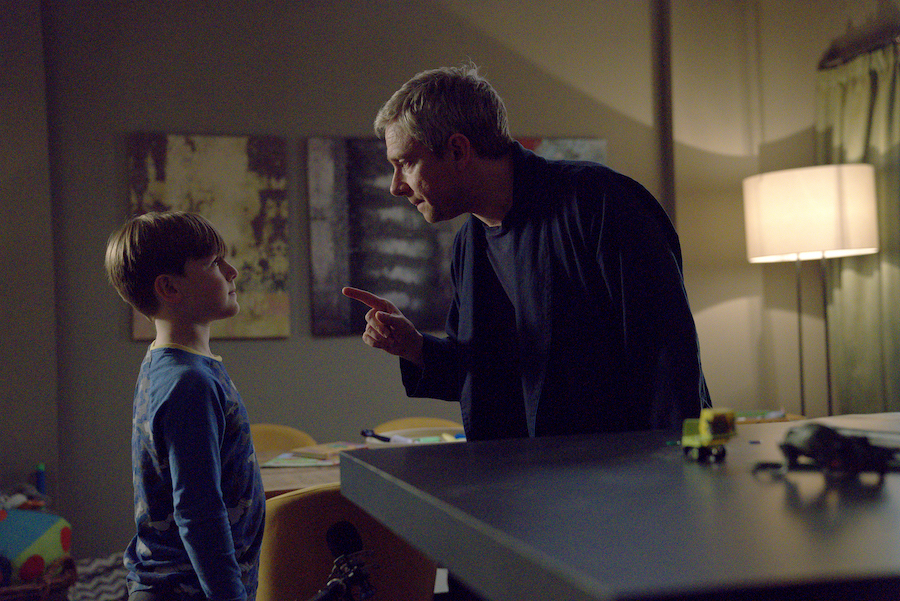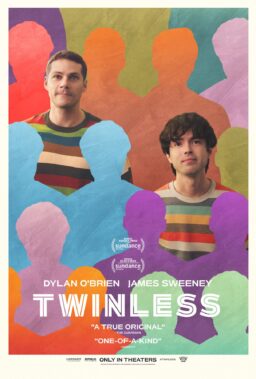Great actors don’t guarantee that a project will succeed. (Two words: “The Goldfinch.”) In most cases, however, a terrific cast—especially if it’s a small cast, telling an intimate story—can make it easier to overlook flaws, hide insufficiencies, and compensate for the things that don’t work or simply aren’t present. So it is with Daisy Haggard, Martin Freeman, and “Breeders,” a series that is most interesting when it wanders away from its ostensible sweet spot—very dark jokes about parenting and being kind of a jerk at the same time—into territory that’s less easily classified. How we deal with grief. Our own capacity for rage. The complexities of our relationships with our parents, and how those relationships change when we have kids of our own.
The series, created by Freeman and “The Thick Of It” alums Chris Addison and Simon Blackwell, seems committed to hitting some kind of jokes-per-minute minimum, which is fine, but the show is least interesting when it’s trying to be a comedy. When writers Addison and Blackwell let “Breeders” wander away from its thesis, and especially when they allow Freeman and Haggard to play messy and complicated, it shows tremendous promise. It’s the kind of show a second-grade teacher might say is “bright, but not living up to its potential.”

That’s the kind of sentence that would absolutely infuriate Paul (Freeman), a nice guy revealed, through the stress and turmoil of raising two kids, to be kind of an asshole. The series opens with Paul giving himself a little pep talk about not screaming at his children, who are upstairs being loud while he’s downstairs trying to work. He talks himself off the ledge, reminding himself that he loves them and that blowing up at them won’t help. Then he opens the door to the room in which they’re playing and absolutely explodes (Freeman, like many of our greatest British actors, has a knack for delivering colorful profanity.) While his temper is unrivaled on the series, his exhaustion, frustration, and subsequent feelings of shame and inadequacy are mirrored in his partner Ally (Haggard); their love for their kids, and for each other, doesn’t keep either from moments of pettiness or fury. They are both helped and hindered in the ordinary but impossible act of parenting by their parents, whose own insecurities, baggage, and selfish impulses don’t cancel out the good things, but aren’t great, either. It’s a lot. No wonder their recycling bin is so frequently supplied with freshly emptied bottles of booze.
The frustration is understandable, and Haggard and Freeman make Ally and Paul easy enough to empathize with. Well, easy to empathize with Ally. Paul’s struggle to come to terms with his own newly discovered capacity for blinding fury, often pointed directly at two of the people he loves most in the world. The line “Breeders” chooses to walk here is an interesting one, but the balance doesn’t always work; Freeman stumbling through sleep-deprived conversations with his frightened son about why the house isn’t going to burn down by pivoting to how burglars won’t get in is funny, but Paul coaching his son on how to make the doctor think he’s not being abused (which he’s not), less so. Paul’s uncertainty about himself, and what his anger says about him, is compelling, but the show’s uncertainty about that same thing is simply confusing. That’s particularly when the children (Jayda Eyles and George Wakeman) are on screen. For a show aiming to explore the difficulties of raising kids in a frank way, it’s strangely disinterested in the children themselves, who, in the five episodes provided to critics, are pure plot devices. Adorable ones, but plot devices just the same.

Luckily, the grandparents are much more well-developed, and in that arena that “Breeders” succeeds. Ally and Paul’s relationship is the show’s constant, whereas the relationship each has with their parents is constantly shifting and evolving. Paul remains close with Jackie (Joanna Bacon) and Jim (Alun Armstrong), particularly the latter, with whom he regularly goes for a pint and in whom he confides some particularly messy feelings about parenting; in these early episodes, the series focuses much more on Ally’s relationship with her unreliable father (a terrific Michael McKean) than with her mother or either of Paul’s parents. McKean plays Michael as a contradictory figure, which is perhaps why the episodes that center in some way on him are among the strongest—when he is able to be both a manipulative force and an empathetic, kindly, and somewhat sorrowful one, the tone for the rest of the series snaps into focus. That’s especially true of the standout fifth episode, a meditation on grief centered on the death of a gerbil which Freeman, Haggard, and McKean fill to the brim with things unsaid, emotions too layered to be pinned down as any one thing, and a willingness to experiment with how the show’s dark humor and its genuine pain can and should intertwine.
It’s episodes like that one that make “Breeders” worth giving a shot, even if the four episodes which precede it don’t always work. Even then, Freeman and Haggard come damn close to concealing the missteps. That’s fitting, in a way—“Breeders” wants to tell a story about the chaos and certain (if occasional) failure that awaits anyone hoping to raise a decent human being, an act that, despite those failures and missteps, is undeniably worthwhile. So is creating and breathing life into a genuinely complicated, messy character. It won’t always go all that well, but if your aims are high, then it’s time well-spent.
Five episodes screened for review.












